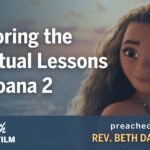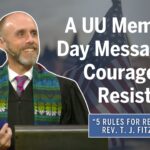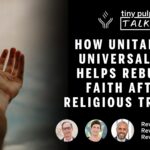Foundations: All or Nothing | Rev. T. J. FitzGerald | 08.18.2024
Sermon Transcript
The Lord is my shepherd, I shall not want. They maketh me to lie down in green pastures. It is beautiful to hear the choir back in the loft even though they’re no longer in the loft. It’s also beautiful to hear the choir sing to us with a gender language that is open and representative of so many of our experiences, and it’s also liberating personally to not to fear that I might burst into flames on the spot for saying that. More on that in the sermon. All of this, these feelings, are thanks to liberal religion. For those of you wondering if I’m fooling with you or if that’s just a play on words, or for those of you who like bigger words, you may be wondering if liberal religion is an oxymoron. I assure you it is not. If you get anything from today’s sermon, it should be that religion can be liberal, and that the two are not mutually exclusive, and that is good news.
We are talking about things that are mutual today because today we’re talking about the second smooth stone in James Luther Adams’ On Being Human Religiously as part of the series on the foundations of our faith. The second smooth stone in that essay is mutuality and consent. Again, do not adjust your dials. Hear me now, you can be religious and you can be liberal. You don’t even have to own a Subaru to do it. It does help, however. It’s true. It’s true, there are a lot of oxymorons running around this country, in this state right now. A lot of oxymorons, people. It may feel like this second smooth stone is one of them, mutuality and consent in religious affairs, but it’s not. A little backstory, this image or metaphor of the stones comes loosely from the five stones that David, or King David, is said to have used to slay Goliath, the Philistine. Now, when I was little, I didn’t understand really what a Philistine was.
I’d watch an old-timey movie or something, and some dignified person would clutch their pearls and accuse some other person of being a Philistine because they didn’t know which fork to use or went to put the napkin in their lap. I grew up thinking I was a Philistine. What happened eventually though is that I learned later in life that the Philistines were a group of people who lived in the five kingdoms in the Middle East and the Bronze Age on the Mediterranean in the area we know of today as Palestine. Philistine, Palestine. The people who lived in that area in the Bronze Age were mostly from Crete and thought of themselves as Greeks, part of the Greek world. The story of the Hebrew scriptures cast Goliath as one of their champions, “A great person, a great man,” they said. Nine feet in height, some have wondered. The story in the Hebrew scriptures there has David, a shepherd, using a slingshot and five smooth stones to kill Goliath and to end the battle between Israel and the Philistines.
Lately, I’ve wondered if the whole point of that story was meant to be that one death is too many and should awaken everyone to the misery and insanity of war, but David is not an easy character to grasp. He’s credited with a lot in the Hebrew scriptures. He is said even to have composed many of the Psalms, which we know now is not true. He’s also said to have slain Goliath, as we said, but just a few books later in the Hebrew scriptures, there’s a story about another shepherd boy by a different name who also killed a Philistine with five smooth stones leading some scholars to consider whether the Goliath story really is just a story. But as far as I’m concerned, debates about the factual truth of these stories, attaching too much meaning today to the liberal truth of them can obscure the deeper truths of these stories that make up part of a whole people’s imagination and hope for the future.
David did not deliver all the world to freedom, and so it was not actually considered the Messiah people hoped he would be. But after another 1000 years or so, Jesus was also considered the Messiah by some in his community. When I had my first meeting with the UU minister, I made a little appointment and needed to tell him all about myself. I said I was reading a book about Jesus at the time and he said, “Oh, yeah. He’s just one of the historical… Jesus was one of many millennial prophets preaching about the end times at that time and full stop.” I don’t know if I was scared or frightened or sort of thrilled, but to hear a minister at that time saying something like that, something kind of unsettling. Then I went to seminary where we learned that a lot of the people who wrote about Jesus and whose words are contained in the Christian scriptures, some lived almost a century after Jesus lived. They created stories about Jesus, and those stories became the religion of Christianity.
To write better stories then, these are great authors with more resonance and appeal, they used sources and poetry and recognizable themes from the Hebrew scriptures to build this case of the Messiah. They even used things like the 22nd Psalm whose first words were Jesus’ last, “My God, my God, why have you forsaken me?” That’s how the 22nd Psalm starts. Then the super popular mega hit, the 23rd Psalm, envisions Jesus as a shepherd, as we heard today somewhat. Was Jesus a shepherd in life? No, he was a carpenter. Right. David was a shepherd. The idea and theme that arose with Jesus as a shepherd is more about what Jesus became to others after he lived. In the Gospel of Matthew, it says that, “The son of man,” understood to be Jesus at the time, “will return and separate the sheep from the goats,” which means the sheep go to heaven and the goats go to hell, depending on the translation you read.
What started as two Psalms, two Psalms that were sung in early ancient worship, Psalm 22, Psalm 23, credited wrongly to King David, became defining moments and attributes in the life of Jesus by authors who did not know Jesus. Then this identity is how many people came to know and learn about Jesus and how he might come back to the world and sort us all out. I have written here to pause to see if I’m going to be smited. All right. We are good. I mention all of this though because that is the exact world that James Luther Adams was born into. This theologian, this ethicist, his father was an itinerant millennial preacher in the Pacific Northwest going around preaching to people, “Repent. Repent. The end is at hand. Jesus is coming to separate the sheep from the goats,” he would say. All of this was part of Adam’s life for years of his childhood. It’s what he knew of faith.
Then his dad got sick, and James had to drop out of school and go to work on the railroads to support his family at the age of 16. He saw some stuff in his day, but he got through that. Eventually he was able to go to college, and he went to Harvard. There after Harvard he became a pastor. He became a Unitarian minister, served two of our churches in Massachusetts. After doing that for seven years, he traveled to Germany. There he met with luminaries of the theological world, really the golden age of theology that many people still look to where Karl Barth was working, where Albert Schweitzer was working. He got to know these people and other theologians who were united in their clandestine work of trying to combat fascism and the rise of the Nazi regime in Germany.
He learned there about the importance of faith, of faith for our freedom, the importance of leading people in an open-minded, open-hearted way, in a way that was not absolutist, that was not leading people to a solution, to a way of thinking that led to the mass extermination of people on this earth that came about in Germany then. This spurred his move from pastoring then to teaching and to teaching specifically ethics. In his teaching of ethics, his life’s work was devoted to bringing about a free expression of religion, specifically of Christianity in his case, to try and free people from the strictures, from the binds of their faith, of their religion. It was in this spirit that he composed his essay about the five smooth stones. Now, to Adam’s credit, neither David nor Goliath are actually mentioned in his book. The only David… There’s two Davids that are mentioned and one of them is Henry David Thoreau, so he gets us.
I think of the stones myself as what we will need to build with to build something powerful, to build something durable in the days and the years to come because we stand in a long tradition of peace-seeking people and the great tradition of people who want to turn what we’re swords into plowshares. Who want to build something, not tear it down. The first stone we talked about last week, I thought Beth really knocked out out of the park because it kind of stayed with me all week one of the things she said is that, “The opposite of liberal isn’t conservative. The opposite of liberal is orthodox.” The first stone is that we don’t stop learning. That revelation is not sealed. If archeology and textual study tells us that David didn’t write the Psalms, we consider that. We take it into a new consideration like we’re doing right here, right now, unsmitted, which is great. The second smooth stone now moving through is mutuality and consent. Mutuality means understanding that humans are all different. We are not the same.
There is no one size fits all or all or nothing set of beliefs for humans that we have found yet. Mutuality means seeing other people wholly and fully. It means believing that all people can work together to provide to one another all that we need to thrive. That to do this we might need, we might need a deeper, more intimate understanding of the needs we have to flourish in this world. Essential to mutuality is that we practice it not by coercion, not by duress, but by consent. That first reading from Adam’s essay warns us not to let, “persuasion,” in quotes, be perverted into a camouflage for duress. Persuasion, perversion, camouflage, duress. It does sound like the lineup for the next Calvin Klein series of scents. Persuasion. Sorry. He puts persuasion in quotes because it’s something that’s in the original text, and duress is something that takes away the ability to decide.
Persuasion, but duress is what he’s really talking about. Duress is a pressure that is applied so acutely that it takes away your freedom. Duress is so serious in fact that the law itself recognizes responsibility for a person’s actions a little bit less when they do them under duress. If you sign something under duress, the law says you are not responsible for what you did. That’s what duress means and how serious it is and how widely it’s understood. Adams grew up with a kind of faith that tells you, “You’ve got to do certain things or you’re going to hell,” and that, “Jesus might arrive at any moment, split open the skies and start sorting us into livestock.” Then he saw movements in Germany in the latter 1930s that literally killed his friends. When totalitarianism, control of all and nothing less, took hold, Adams saw this as another form of duress because to oppose the aims of that movement meant torture and death.
It was all or nothing. There is, I know, something alluring to an answer to everything, to a system that takes everything into account and spits out an answer, a way to guarantee maybe a trip to salvation, a way up to heaven. But the thing about orthodox faith, and I grew up in one, so I have a little bit of an idea about this I think some of you might have too, is that not everybody in those faiths even believe every element of them. Even if they do, even less people learn that actually practice all of the things that they’re told that they’re supposed to do in them, and so over time people start to free themselves this or that. They grow up. They see a little bit in the world and there’s lots of reasons for it. They might just start seeing the grays in the world between the absolutes that they grew up with. They might just start including something like finding universalism, which many writers today are finding this thing that we’ve been preaching about since the 1700s, which is fine, that everyone is saved and going to heaven.
Many in this category who discover universalism, they talk about a kind of conversion experience that has a lot to do with holding their firstborn child and looking at that creation and having a moment where they realize that no God that they could believe in would ever damn something it created to hell. That’s an awfully dim view of God. Wrapped up in many conflicts we are bearing witness to now is an often unspoken element of all or nothing thinking. Sometimes it is a set of beliefs about religion or destiny. Sometimes it seems political, but very often it’s really a conflict about land and who gets to be on it and the consequences for being there. All of these are all or nothing, zero-sum ways of thinking. They leave children of the earth crying to the heavens, “My God, my God, why have you forsaken me?” Mutuality, real mutuality, it combats this thinking, friends.
It’s a discipline and it’s not easy, but the unadorned understanding of one another, and the pains that we are feeling as people locked in our shared and bound together in our shared human destiny is the most human response to the suffering of others. It is at the root of the way that this faith has risen and grown in the way it practices justice out in the world, fighting as we do for the right to self-determination, to free ourselves and others from the tyranny of thoughtless compliance with ancient stories that still justify deadly force, that ring out through prayers and through songs and through ways that we practice today. That is the goal to uproot, to make use of, and to find new foundations for a faith. That is the goal of any faith worth having today. The poet says it.
The poet says it, “I shall leave the cathedral with the mass half sung. I shall leave the temple before the bell has rung. I shall leave the llama and his staff in his pole and seek another way to save my soul. Half trusting all the deities. To know God, I am true. Half a skeptic, half a nun. I come to you.” Mutuality. For me, the you in that poem is you. From the first meeting with a minister who said something that blew my mind to right here today standing in this place, my liberal religion filled, yes, with oxymorons. Lots of them. More every day, I am sure. But imbued it is with freedom to take the weapons of killing, like the five smooth stones, and lay them down as weapons of killing must be laid down one day and use them as the basis of the pillars that will support this faith, this church, and all of us, and all those who will follow us here because anything worth doing in our lifetime we may not see accomplished.
We must be here for the generations that are coming, for the many years to come. It is mutuality, it is the fierce and the unafraid journey into knowing and loving others not because we are forced to, not because some story said to, but because we want to and we choose to. This is the greatest journey before us all, and it is only from this work of mutuality and by doing it well that we may at last fulfill the prayer. Surely, goodness and mercy shall follow us all the days of our lives, and we shall dwell in the house of the divine for all our lives long. May it ever be so. Blessed be, and amen.








